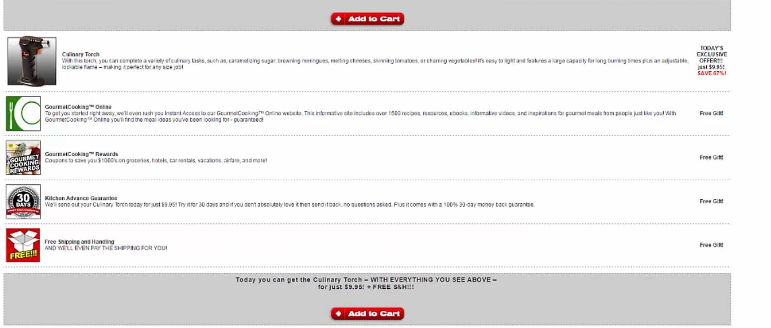Feds Shut Down “Risk-Free” Online Marketing Scheme Peddling Golf, Kitchen Products
As we’ve mentioned before, many companies try to lure consumers into purchasing products — be it skincare treatments or weight-loss supplements — by plastering offers for “free” or “risk-free” trails on advertisements. But as federal regulators reminded us once again, these deals often aren’t free, and don’t come without risk.
The Federal Trade Commission announced today that it charged a group of online marketers with deceptively luring consumers with “free” and “risk-free” trials for cooking gadgets, golf equipment, and access to related online subscription services.
The FTC complaint [PDF] — which names Brian Bernheim, Joshua Bernheim, Jared Coates, Robert Koch AAFE Products Corp., JBE International LLC, BSDC Inc., KADC Inc., Purestrike Inc., and BNRI Corp., formerly known as Bernheim and Rice Inc. — accuses the marketers of deceiving consumers about the actual cost of their products and making it difficult for them to cancel subscriptions.
The companies marketed their products under various names, including Kitchen Advance, Gourmet Cooking Online, Gourmet Cooking Rewards, Medicus Golf, Kick X Tour Z Golf Balls, Golf Online Academy, Golf Tour Partners, and Purestrike Swing Clinic.
According to the complaint, the companies used TV Infomercials, websites, and emails to mislead consumers into believing that the products and services being advertised were free.
In reality, the companies charged consumers’ stored credit cards for the products if they did not cancel their “free trials” or return the “free” products in a certain amount of time.
For example, Tour Z Golf Balls website makes a prominent claim that consumers can try the product for “FREE!” followed by an “Add to Cart” button.
The trial offer, however, was not free if customer did not cancel and return the golf balls within a prescribed amount of time.
In another instance, the FTC found that the company’s “bundled” offers — which included one product combined with free trial offers for one or more continuity plans — automatically enrolled customers into programs they were unaware of.
For example, one of the company’s websites bundled an offer to sell a Culinary Torch product with free trial offers for two online cooking subscriptions.
The FTC claims that the marketers failed to provide adequate disclosures or obtain consumers’ consent before enrolling them in an online subscription program on a free trail basis for 30 days to 60 days at a cost of $9.95 per program for each 30 days unless canceled.
Additionally, the complaint alleges that during the purchasing process, the companies sign consumers up for more “free trials” after forcing them to click through as many as 14 upset pages to reach the final confirmation page.
Canceling the programs and other product shipments was easier said than done, according to the FTC, as the companies often buried the process in the fine print that could only be reached through a small hyperlink.
The FTC claims that cancellation and return requirements, and other information were not disclosed in a manner that consumers could reasonably see, read, or understand.
In all, the FTC claims the companies violated the FTC Act and the Restore Online Shoppers’ Confidence Act.
Want more consumer news? Visit our parent organization, Consumer Reports, for the latest on scams, recalls, and other consumer issues.



